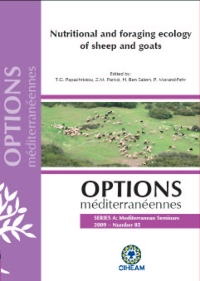| Article précédent | p. 61-65 | Article suivant |
Effects on the environment of a flock of sheep when free ranging or under the guidance of a shepherd
Nowadays, sheep grazing is often proposed as a means to maintain abandoned spaces of the territory. The objectives of feeding animals, optimal management of fodder resources and conservation of the pastoral value of the environment are not always compatible with the free ranging of the animals in fenced paddocks. The purpose of this study was to compare the feeding behaviour of a flock of sheep when they were free-ranging versus under the guidance of a shepherd. We determined the feeding behaviour of a herd of ewes at the beginning of gestation grazing on lowlands of the French Mediterranean littoral with or without the guidance of a shepherd. Free-ranging animals selected some feeding sites and overlooked the remainder of the paddock, producing a loss of fodder resources and a degradation of their pastoral value. The intervention of the shepherd, if it takes into account the spontaneous feeding behaviour of the animals (preferences and selection of food, social interactions, and diet composition) allows a more complete utilisation of the landscape and the forage resources available.
Aujourd'hui, le pâturage des ovins est souvent proposé comme moyen pouvant participer à l'entretien des espaces abandonnés du territoire. Les objectifs d'alimentation des animaux, de gestion optimale des ressources fourragères et de conservation de la valeur pastorale du milieu environnant ne sont pas toujours compatibles avec le libre parcours des animaux dans des parcs clos. L'étude présentée a pour but de préciser le comportement alimentaire d'un troupeau de brebis en début de gestation au pâturage sur des landes arborées du littoral méditerranéen français en libre parcours et sous la conduite d'un berger. Il apparaît que lorsque les animaux sont en libre parcours ils sélectionnent certains sites alimentaires et délaissent le reste du parc. Il en résulte une perte de ressources fourragères et une dégradation de la valeur pastorale. L'intervention du berger, si elle prend en compte le comportement alimentaire spontané des animaux (préférences et sélection des aliments, relations sociales, composition du menu, etc.) permet une valorisation plus complète de l'ensemble de la surface et des ressources disponibles.
- [ Afficher ]
- [ Télécharger ]
- [ Exporter la citation ]
Vous pouvez télécharger la citation au format :
- [ Imprimer ]
-
Mots-clés
BREBIS, COMPORTEMENT ALIMENTAIRE, ENVIRONNEMENT, LANDE, NUTRITION ANIMALE, OVIN, PATURAGECiter cet article
Rochon J.J., Duval M., Goby J.P. Effects on the environment of a flock of sheep when free ranging or under the guidance of a shepherd. In : Papachristou T.G. (ed.), Parissi Z.M. (ed.), Ben Salem H. (ed.), Morand-Fehr P. (ed.). Nutritional and foraging ecology of sheep and goats. Zaragoza : CIHEAM / FAO / NAGREF, 2009. p. 61-65. (Options Méditerranéennes : Série A. Séminaires Méditerranéens; n. 85). 12. Seminar on: Nutritional and Foraging Ecology of Sheep and Goats, 2007/10/11-13, Thessaloniki (Greece). http://om.ciheam.org/om/pdf/a85/00800985.pdf



